published: 18 /
5 /
2004
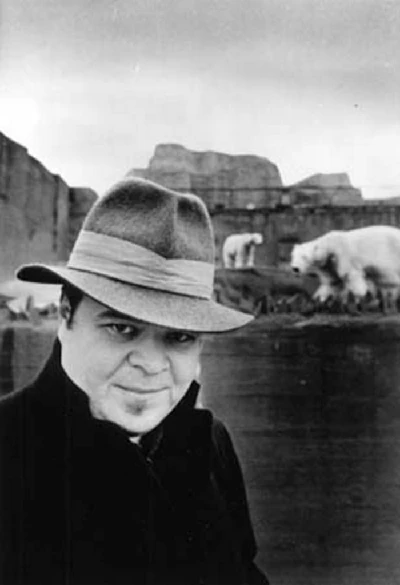
Pere Ubu's David Thomas has reformed his first group Rocket from the Tombs almost 30 years after they broke up. He talks to Jon Rogers about the ardours of going back on tour with them, their new album 'Rocket Redux' and his disillusionment with punk
Article
Cleveland's Rocket from the Tombs (RFTT) never released a record during the period they were originally active for roughly one year from around June 1974. In that short space of time, they, however, managed to have an incalculable impact on the birth of punk in America. In fact, their short life meant that the band and its history ended up surrounded in mythology, the subject of rumours of thrilling, explosive live shows, fundamental ruptures within its ranks that caused half a dozen line-up changes as well as spiralling drug problems with some of its members.
The group was effectively lead by singer David Thomas (aka Crocus Behemoth) and, later, guitarist Peter Laughner. After an early version of the band that played parodies of 50's and 60's rock and roll , Rocket from the Tombs made a fundamental change in direction when Laughner joined the group. The group took on a much darker, misanthropic, bleak view. Songs like the sarcastic 'Ain't it Fun', 'Life Stinks' and the psychodrama of '30 Seconds Over Tokyo' as well as 'Final Solution' captured the band's grim, unsettling stance and propelled them to notoriety as part of Cleveland's underground scene along with bands like the Electric Eels and the Mirrors.
In fact the group only ever managed to do a handful of recordings. Along with various original songs the band attempted covers by some of their musical influences: the Rolling Stones, the Stooges and the Velvet Underground. Having never actually released anything, this just added to the mythology that was slowly building up around the band, especially after it had fractured apart into two separate bands - Pere Ubu and the Dead Boys. Then, later, came the death of Laughner which only compounded the rumours and tales. The only way to hear the band was via poorly recorded bootlegs, most notably 'Life Stinks' in 1990, to which word of mouth notoriety only fuelled the ever growing legendary stature of the band.
Then finally in 2002 the band rounded up a collection of songs from the original sources and put out 'The Day the Earth Met the Rocket from the Tombs' which included rehearsal tapes and miscellaneous recordings. Encouraged by the critical success of that, the band augmented by Television's Richard Lloyd, then went into a studio to finally record the band's songs. The result of this, 'Rocket Redux', was released earlier this year.
The original version of RFTT which, according to Thomas was formed in late 1973 when he was writing for "a weekly Time Out thing" magazine usually under the name Crocus Behemoth, which he used for his humorous pieces (the name coming from randomly selecting names from a dictionary with the help of his then girlfriend who was loosely associated with the Weather Underground). The magazine did lots of promotional things to get the name known and one idea was to form a band, and RFTT grew out of that.
This initial band effectively played spoof-rock as it satirised the rock and roll of the 50s and 60s with songs like 'Hey Punk' lambasting Jimi Hendrix's 'Hey Joe'. This early line-up has often been said to have been heavily influenced by Frank Zappa, of whom Thomas was meant to have been a huge fan. While Thomas admits to have been a fan of Zappa whilst at high school he says Zappa's influence on the band wasn't that strong.
"The first gig RFTT ever did was to play the entire 'Kick out the Jams' album by the MC5. It wasn't early Zappa. In the very first band there was a lot of satirical songs, at least in our juvenile imagination. I suppose that came from Zappa."
The importance of RFTT though really begins with the introduction of Laughner, who had previously been in the band Cinderella's Revenge.
"I was a big fish in a small pond due to my writing under the name Crocus Bethmoth,. We would run across each other. He was one of the more interesting people in town in the music business. Peter was playing kinda folk-bluesy shows at this place [a folk club called the Grapes of Wrath'] across from the Viking Saloon, which was where I hung out a lot and he knew I had this band and he asked me if I could be in it. I was delighted because I knew Peter was a good guitar player and song writer. Nobody else in the band was really that good."
The recruitment of Laughner also roughly coincided with the demise of Thomas' interest in music journalism. "The classic story is I was interviewing Black Oak Arkansaw, I was interviewing the lead singer Jim Dandy at Swingo's this rock and roll hotel in Cleveland, one of the truly infamous hotels in America for that sort of stuff. I was sitting there just asking questions and this sort of epiphanous moment just came over me where I thought I really don't care what the answer is. And, in fact, I knew what the answer is going to be and I really didn't care any more. I basically, dropped out of the whole situation. I knew I could do music better than they could so I became a musician."
The band underwent a radical transformation with the rest of the band effectively being jettisoned in favour of guitarist Gene O'Connor (aka Cheetah Chrome), bassist Craig Bell and drummer Johnny Madansky.
In December 1974 this version of the band made its live debut at the Viking Saloon along with two other bands that, together, would make up the underground scene in Cleveland - the Electric Eels and the Mirrors.
"We didn't call it a scene particularly. But we all knew each other. It was a small group of people. I don't think it as ever more than 100 total of musicians, fans, wives, good buddies... It was a very small scene. There wasn't really any location to it other than people's houses. Every so often someone would convince some crummy bar to let one of the bands play there. Then we'd all play there before the owner wised-up. Or went out of business or got busted. It was desperate in that it is was all very low key and running on shoe-strings. That was in contrast to the over-ground or mainstream rock which was flourishing. Cover bands were everywhere. A good cover band could get a 1,000 people to see them play."
The band was now playing high-energy rock, showing the influence of Detroit bands like the MC5 and the Stooges with songs like 'Down in Flames', '"Transfusion' and 'Redline'. At the time Laughner expressed his desire of wanting to do something more with music than simply play rock 'n' roll:
"Now all it does is sort of lull you into a state of complacency, the major concern being strictly to have a good time. Entertainment is fine, but there has to be something beyond that. It may sound pretentious to talk about making art statements, but it is possible to make an art statement with music."
Nowadays with easy accessibility of recording studios and thousand of tiny independent record labels it is relatively easy to make a record but back in the mid-1970s that infrastructure didn't exist, effectively blocking out bands like RFTT.
"It was an idea that was just beginning to percolate. It wasn't like why didn't you do it, looking back now when everyone does it and it's really simple. At that time it wasn't simple. There weren't thousands of these little home studios. There were only three real studios in the city at the time. And those were very high-powered places at the time. Cleveland Recording, which is where we ended up recording, was putting out all that Grand Funk and James Gang stuff."
Another falsehood that Thomas slays is a report that the band towards the end of its life was about to record and release a single with a cover of 'Wild in the Streets' as its lead song and 'Final Solution'as its B side.
"One of the tensions in the band was that Peter always wanted to do cover versions. And I was dead set against it and at one point at the very end he became obsessed by Garland Jeffreys who put out this song called 'Wild in the Streets' and he was playing around with this idea and I was so fed up that I wouldn't even talk about it . It was never serious. It was never going to happen. Or it was going to happen over my dead body. It wasn't a serious issue."
Historical accounts of the band invariably point to the disparate musical influences of the band members who were fighting over the direction of the band. Much is made of the supposed conflict over Frank Zappa, Thomas supposedly being an advocate while Laughner was unimpressed with the former leader of the Mothers of Invention. Thomas though rejects this out of hand:
"I wasn't in to Zappa. I don't know where this Frank Zappa comes from. No one in the band was into Zappa. I don' know what that's all about at all."
But the tensions were there though. Thomas though says that those weren't to do with differences over music: " The division in the band was really between some people that you'd call grown-ups and some people in the band who you'd call juvenile wasters. That was really the tension in the band. The musical differences weren't the problem. The problem was the personalities. Peter and I were fed up with Gene and the drummer coming on stage completely smashed out of their minds. We were fed up."
That tension though might have been the spark to create some of punk's most memorable songs.
"The songs were a product of a set of people who had very broad, uncompromising tastes, so you would get some Alice Cooper riff in the middle of some Kinks thing which was in the middle of some MC5 thing which was in the middle of some Velvets thing and so you got a lot of influences that you don't normally get to keep together in one group of people because they don't belong together. That's, I think, one of the secrets of the band and why the songs were so anthemic. They stand the test of time. Some of them are juvenile but even in their juvenileness they are enduring. They are in some way charming."
There was the chilling 'Transfusion', which Laughner wrote with his wife Charlotte Pressler and Gene O'Connor, and contained the refrain: "You didn't bleed" and the Thomas and Laughner penned 'So Cold' that Thomas described at the time as "A hymn to numbness... a cross between Night of the Living Dead and the Utopia Lounge."
Then there was the notorious 'Final Solution', which according to Thomas is a "pastiche of Blue Cheer's version of Summertime Blues. This whole thing about this kid taking his problems to the United Nations."
The song with its reference to the Nazis' extermination of the Jews during the Second World War would supposedly come under justifiable criticism but according to Thomas the band was never actually accused of dabbling with fascist imagery.
"No one ever accused us of that. We were the only ones who ever brought it up. All we ever said was: Final Solution I don't know how we feel about that. The title came from the Sherlock Holmes story 'The Final Problem'. It's not my fault. I wasn't about to turn down a good idea. No one every accused us. We were the ones that brought it up, stupidly."
The song, despite the title, concerns itself with parodied dumb teenage angst and has the lines:
"Ma threw me out 'till I get some pants that fit,
Just won't approve of my strange kind of wit."
Along with many other songs by RFTT, it fitted into that mould of songs expressing teenage alienation and existentialist despair.
Along with the internal divisions, Thomas towards the end of the band was having a crisis of confidence over his unusual style of singing, which was not to everyone's liking. To some, while he was certainly a characteristic front man with his large frame making for an imposing presence at a gig, his singing was far from harmonious and was more atonal howling rather than mellifluous. Laughner wrote to a friend in May 1974, saying: "Crocus is blowing alto sax, sounding freakishly like Steve MacKay on [the Stooges'] Funhouse or Albert Ayler without the vibrato."
Historical accounts, then have a singer from the Detroit/glam band Mother Goose join. Steve Machine who also went under the name Stiv Bators was supposedly brought in as Thomas was effectively sidelined by O'Connor and Bell. Thomas though rejects this version of events.
"This is another myth that Stiv Bators was part of the band at some point. Towards the end, when the band was really doomed, this was around June I was going through somes ort of crisis of confidence as a singer and because we'd never had monitors I'd never really sung before that band so I was thinking I just can't do this. So Gene wanted to audition Stiv for the band, so they auditioned him and they turned him down. I'd said I didn't want to have anything to do with this. So Stiv was never in the band,. He was just hanging around."
"Our last gig was in August and no one wanted to do it. I think the only reason it happened was because Gene wanted to get Stiv up on stage for something. For the encore, Gene asked up Stiv on stage and Peter and I walked off and Craig tried to play along for a bit but it was such a shambolic mess that he just laid his bass down against his amp and walked off. So it wasn't actually an auspicious start for the Dead Boys nor a noble end for RFTT. It was a shambles."
By this stage the band had fractured into mutually exclusive factions. Each member was singing their own songs, effectively backed by the other members, somewhat reminiscent of the last days of The Beatles. Thomas would do '30 Seconds Over Tokyo', Laughner would get to do his beloved covers as well as songs like 'Amphetamine' and Bell would perform '"Muckraker'.
RFTT was effectively over, ripped apart over musical differences and escalating problems with drug abuse. The group split in two with O'Connor and Madansky going off to form Frankenstein (an early version of the Dead Boys) with Bators which was a straight rock and roll band and Thomas and Laughner becoming the more arty Pere Ubu, the name coming from Alfred Jarry's play 'Ubu Rex' which contained the bestial character Pa Ubu.
"The words themselves were meaningless, although they did seem to mean something,. They weren't just nonsense words, which is a bad idea, like sha-na-na. And the connection with Jarry was that I liked his production methods, which called for engaging the imagination of the audience and the process where you put placards that would announce the Polish army crossing a river and one person would walk across the stage. That connected to me with my love of radio, not music on the radio but just people talking or radio drama. Things where sound itself is part of the narrative voice. I wasn't into the juvenile stuff, that was kind of passé by then."
Thomas though rejects the arty-label that is often associated with Pere Ubu
"We were just a rock band. This is how rock bands had evolved to that point. I know that punk has tried to revise this whole history. The purpose of punk was to hijack the destiny of rock music. The purpose of punk was to keep rock music from becoming smarter and to keep rock music from becoming more literate and to keep it from everything it is destined to be. The evolutionary path from 1956 to 1975 or 1976 to make it even. It's moving in a straight line. Elvis' great contribution was that he brought the narrative tool of abstraction and abstract thought to rural blues and hillbilly music, which at that time were dying forms. So the very beginning of rock music is the introduction of sophisticated abstraction and the use of sound as a narrative tool into a folk music. If you follow the line of evolution it grows ever more sophisticated and sound as a narrative technique grows and is subsumed into the mix very progressively until there is an explosion at the very end of the 60's, early 70's of analogue synthesisers that were creating just pure sounds. The influence of bands like Silver Apples, Can and Eno, the Kevin Ayres stuff, Cale. By the mid-70's rock music was really on the verge of dramatic leaps in terms of literateness. You had a bunch of bands appearing at that time like Pere Ubu and Talking Heads and the Residents and Television and a number of other groups, and all of the Cleveland groups were poised on the borders of a brave new world and that's why punk was invented - to stop all of that."
For Thomas, he doesn't see any division between art and rock, later taking on term "avant-garage" (which was taken from a 1979 exhibition at Cleveland University) to describe the Pere Ubu.
"People try to bring this division between art and rock and we didn't perceive of any division. Avant-garage we used because it was a good term that didn't mean anything. People asked us to describe what you do and we would say we're a rock band but they wouldn't be satisfied with that and so once we'd stolen this term we'd say we were avant-garage band and that seemed to satisfy them. We had no other investment in the term other than the fact that it would just shut people up."
Laughner though was having his own problems and was falling apart.
"Peter was a pain in the butt at the end. He was in Pere Ubu from September 1974 to June 1975 and he became increasingly unbearable and unworkable. He'd be too drunk and waving guns around and it was all too much. He clearly was out of control and Tim Wright (guitar and bass] and I had determined that this couldn't go on and something had to be done. It was one of those conversations where Peter was saying I gotta move on and me and Tim were going OK. So he left. We came to it with a notion that we were going to fire him and before we fired him, Peter said he quit. It was obvious to Peter that there were problems but I'm sure he had a different view of what those problems were."
While Laughner would go on to form the band Friction (named after the song by Television) he would be dead at the age of 24.
The history of Pere Ubu has been covered many times before with the band going on to large amount of critical success with albums like 'The Modern Dance' and 'Dub Housing' and Thomas going on to be involved with a number of artistic projects -most notably his collaboration with Two Pale Boys and Ubu Doll. But along with Pere Ubu, Thomas will largely remembered for RFTT, especially now with the recordings at last finally being released.
The original intention though was to release them in around 1990 but this was hampered by Thomas not having the original tapes as well as some mysterious personal reasons.
"We determined to put something out in 1990 or 1991 and started on the process. The reason it took 12 years was that I was only going to put it out if I had the original source tapes and so it took a long time to get those. That inspired lots of digging around and other stuff involving personalities that I'd rather not comment on."
Then inspired by the success of 'The Day the Earth Met the Rocket from the Tombs'' the group decided to do a reformation of sorts and play some gigs in America.
"We did the tour in June last year and every night people were asking if we had anything by this band doing the songs. So after that tour we decided to do a bigger tour in November/December this last year. We're really into merchandising, it's a profitable activity for us. We decided to do a really quick recording before that second tour at Richard's studio and then print it up in a small run that we would only sell on the road and through mail order. So we did that, and somewhere along the line this impetus to actually release it came along and it came about like that. If we were going to print it up anyway we might as well go the whole hog and release it properly. It's the usual botched sort of way we do things. We were doing the tour 3 months before the record came out, which wasn't even meant to come out."
Now there is the possibility of the band touring in Europe this coming September.
"There may be something in September. Touring with RFTT is the most unpleasant experience of my life. I really can't think of anything that I've had a worse time doing. So, we're all really unsure what we're going to do. The band on stage is really overwhelmingly good. People are stunned at times and critics go nuts. We're drawn to it because it's good but it really is miserable touring and being together. As with the old RFTT it's just a bunch of people that don't belong together. We have an offer for something in Europe for September. If it happens we'll do some shows and undoubtedly at least one show in England. We're dancing around the subject of writing some new material. We all want to do it because it's really good but we're wary of doing it because being together is so miserable. Because it's so miserable doing it if we're not able to not produce something wonderful, unique and powerful it won't exist. It's impossible for this thing to go through a mediocre period: it's not worth it."
Despite the largely influential role Thomas and RFTT has had on many punk and post-punk bands, Thomas is surprisingly hostile to the lasting influence of punk on music today, calling it:
"An invention of multinational corporations, chicken-hawking industries. It was a profoundly anti-American movement that sort to crush American cultural forms in a reverse imperialistic grab. If somebody had done this to some little tribe in Nigeria there'd be absolute outrage. It was absolutely an anti-American, anti-culture effort.
"The point is this. American rock music is always played with an authenticity that can never be matched by anybody else no matter how talented. This is nearly an exact quote from a famous Russian cultural writer called Artemy Troitsky and I became aware of this through talking with him and visits to Siberia at the end of the 80's. There was no punk in America. Music was very happily moving down the course of greater sophistication - Talking Heads, Pere Ubu, Television. Punk wiped all of that advance. It was the counter revolution. It destroyed music in America for decades and probably still has destroyed it. It certainly has wiped out the manifest destiny of the situation. Punk is the notion that you sell the car by putting the girl on the hood of the car. It's the victory of style over substance. Of appearance over reality. Of this notion that anybody can play music and express themselves; that self-expression is the be all and end all. It's all crap. Art can not be done by everybody. It never has and it never will be. Punk was the victory of the ideology of the Madison Avenue advertising agencies over culture. Punk has won for the time being. We live in a punk world. This is what spin-doctoring is about. All the graphics are punk, all of the approaches are punk, all the points of view are punk. Punk has to be seen in a far wider context than just a bunch of pub rock bands. It had far deeper roots and anti-culture roots than it admits to."
"Up until quite recently, about the 90's, it would be that youth culture would recycle completely every couple of years - every 2 or 3 years the fashions would totally change, a set of new bands would come in. Under punk that cycle began to slow down very quickly after 1978. By 1989-90 that cycling had totally stopped. There has been no cycling of youth culture since 1990. This is attributable to the victory of punk. I'm not advocating that the cycling of youth culture every 2 or 3 years was something that was good but I sure as hell know that non-recycling of anything is bad. Fashion nor music has not changed since 1990. Nothing has fundamentally changed. It's still the same crap. And that's deeply disturbing. You could take a still today from 'Top of the Pops', or whatever symbol you want, and take a still from 1990 and you would not be able to tell the difference. I think that is deeply disturbing. All this is attributable to punk."
For Thomas, punk has a lot to answer for.
Band Links:-
http://www.ubuprojex.com/
https://en-gb.facebook.com/official.ub
https://twitter.com/ubuprojex
https://en.wikipedia.org/wiki/Pere_Ubu
Picture Gallery:-
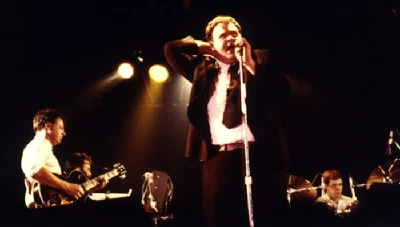
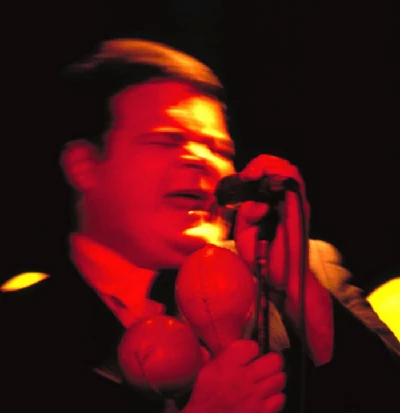
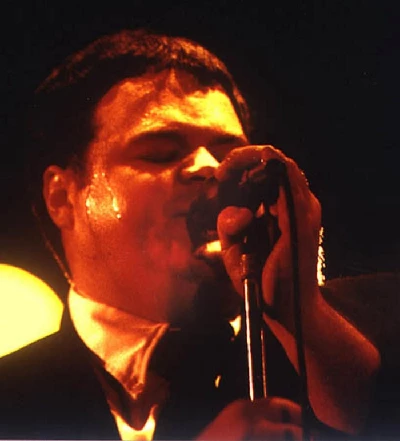
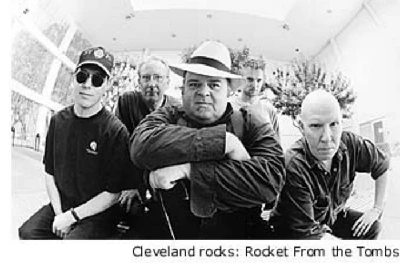
Visitor Comments:-
|
|
199 Posted By: Paul Ray , Oxfordshire, England on 13 Jul 2009 |
A very interesting interview. It taught me a tremendous amount about Rocket From the Tombs that I never knew before, while I don't really need to hear David talk about Pere Ubu too much because they've been my all-out favourite band for an amazing THIRTY years now and I've always obsessively collected and filed information on them. I briefly met David Thomas and Allen Ravenstine after a gig in London too, and they were very cool and impressive, though David was the only one who wasn't evasive regarding questions.
|